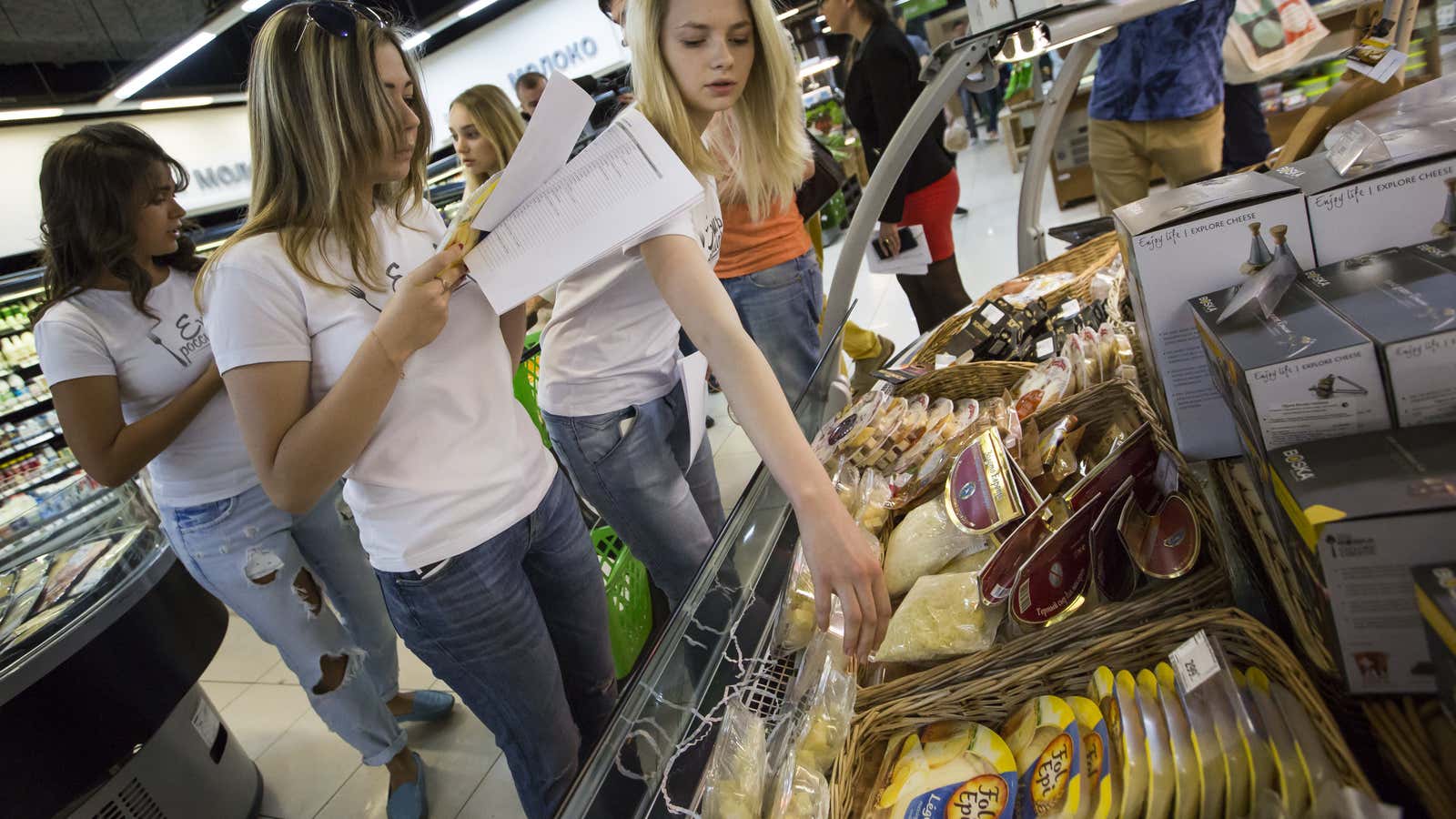Lorenzo Getti makes for an unlikely Russian nationalist hero.
The handsome, 28-year-old Italian saw sales at his Moscow-based, Italian specialty-foods firm fall nearly a third in the first six months after Russia banned most Western food imports in the summer of 2014, in response to Western sanctions on Russia.
But he found good-quality Russian milk and meats, imported cheese-making equipment and other materials from Italy, and began making his products in Moscow. And by the time he was up and running, buying “Made in Russia” had become a nationalist salute to the motherland.
“Before, people wanted to buy imported cheese, not local cheese,” said Getti at “It’s Time For Moscow,” a conference organized last December by the Moscow city government and RBC, a digital media giant owned by the billionaire Mikhail Prokhorov. “But the sanctions have made it the opposite: now they are happy to buy local, and the prices are cheaper!”
These days, DaLorenzo churns out respectable provolone, gorgonzola, prosciutto, salami, and more. “The results are very good,” says Getti, a father of two originally from Rimini, near the Adriatic Sea, who moved to Moscow in 2010. “It’s not exactly as we have in Italy, but they are the real deal and our clients are very happy.” Sales haven’t recovered fully, but they’re stable and costs have fallen. As well as two cafes and his online shop, Getti recently opened a pizzeria in central Moscow. It’s called #byItalians, with the slogan, “Made in Itali.ru.”
Some Russian industries are suffering as a result of Western sanctions. Overall, manufacturing has fallen by about 3%, and retail nearly 9%. Yet Russia’s import-substitution efforts, designed to promote domestic industry, are vast, involving some 2,500 projects worth $38 billion.
The import ban has dented the supply of many goods, but the boost in domestic production has taken up some of the slack. For many foodstuffs, the ban has encouraged investment and development—today, according to the central bank (pdf, p. 32), many edibles are more plentiful than they were before the ban:
“Import substitution has become a really innovative area,” Nicolas Chavrot, a Moscow-based entrepreneur from France who runs a food supply business, said during the conference. “Market participants are ready to consider new alternatives. Everybody is open. If you have some new manufacturing, new production techniques, they say, ‘Please show us.’”
Russia’s import ban has hit European farmers hard. Copa Cogeca, a Brussels-based farmers union that includes EU agricultural organizations, estimates €5.5 billion ($6 billion) in losses as a result of Russian sanctions. Russian producers, on the other hand, are benefiting from the cheap ruble. Last April, a Russian producer in the Tula region was cleared to export turkey to the EU. A month ago, Russia re-started poultry exports to the EU as well.
And Russians seem to have accepted the new status quo. In an October poll from Romir research, 71% of respondents backed the embargo and more than half said they saw no decline in the quality of food products available.
It’s not easy for everyone. Dozens of Italian chefs have reportedly returned home. Valentino Bontempi, chef and owner at the Moscow restaurants Bontempi and Pinzeria, had to alter his menu because some ingredients are no longer available. And inflation has made many others more expensive.
Yet Bontempi has kept his prices the same. His profit margins are down about 30%, but he says business has remained steady. And he has good things to say about the Russian foodstuffs on offer. “It can be a little bit irritating—to look for new products, to attentively choose good quality, to follow the prices every day—but there’s no problem finding good products in Moscow,” Bontempi said. “I know some big Russian companies that produce an assortment of cheese with quite good quality.”
Because Switzerland has refrained from joining the sanctions regime against Russia, Swiss gruyere, emmental and other cheeses are still available in Russian stores. But more Russian cheeses have appeared, including mozzarella, feta, and camembert, as locals have become more willing to try domestic varieties. With little sign that sanctions will ease this year—largely due to the continuing tensions in Ukraine—Bontempi, Getti, and others expect the range of domestic varieties to improve even further.
Pascal Lamy, former head of the WTO, is skeptical about Russia’s policy. “In most of the cases I have known, import substitution policies have failed,” he said in Moscow last fall. “They degrade the efficiency of their economy.”
Getti, however, expects Russian-made foods to continue to improve. Besides, he feels duty-bound to his adopted homeland. “As an Italian I feel the sanctions are really America’s fault, and Europe is following America’s decision,” he says. “Of course this is something bigger than us. The way out is just to produce here, as the Russian government wants—so we are trying to fulfill this duty.”




